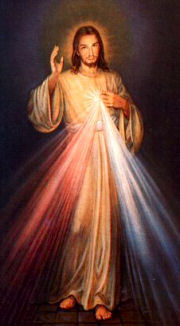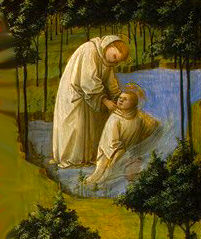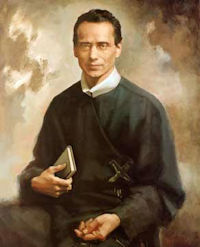Ordinary Time: August 13th
Nineteenth Sunday in Ordinary Time
Other Commemorations: St. Placid of Messina, Monk (RM) ; Other Titles: Placidus
» Enjoy our Liturgical Seasons series of e-books!
During the fourth watch of the night, he came toward them walking on the sea. When the disciples saw him walking on the sea they were terrified. "It is a ghost," they said, and they cried out in fear. At once Jesus spoke to them, "Take courage, it is I; do not be afraid" (Matt. 14:25-27).
The Optional Memorial of Sts. Pontian and Hippolytus, which is ordinarily celebrated today, is superseded by the Sunday liturgy.
Commentary on the Sunday Mass Readings for the Nineteenth Sunday in Ordinary Time, Year A:
The First Reading is taken from the First Book of Kings 19:9a, 11-13a and relates the story of Elijah in the cave and the Lord coming to him in a "still small voice."
The Second Reading is from the Letter of St. Paul to the Romans 9:1-5 in which St. Paul speaks of the sorrow of heart that he has because the Jews, as a nation, had refused to see Christ as the Messiah who was promised to them by God through their patriarchs and prophets.
The Gospel is from St. Matthew 14:22-33. Our Lord sent His disciples to row across the lake, knowing that they would meet strong, gale-force head-winds and be in danger. He did this because He wanted to strengthen their faith and trust in Himself. He intended to come to them at the right moment, working two miracles — walking on the water and calming the storm. This He did and the result was as He had intended — their faith in Him was strengthened, they declared He was the Messiah, the Chosen of God. Peter, already the recognized leader, and always the most daring among them, showed himself ready to risk drowning in order to prove his trust and confidence in Christ. While he trusted in Christ, all went well, but when his faith weakened he would have been lost were it not for the outstretched helping hand of his master. This was also a very necessary lesson in the education of Peter and his companions.
For us, too, there is a necessary lesson in this incident. It is that we must continue to trust in Christ and his loving Father, even when God seems to have deserted us. Most of the troubles and trials of our lives are caused by the injustice and lack of charity of our fellowmen. The remainder can be attributed to our own defects and sins or to some weakness in our mental and bodily make-up. But God foresees all these misfortunes, and can prevent them. Instead he lets them take their course, because they can and should be the means of educating us in our knowledge of life's true meaning and they should draw us closer to him.
Christ foresaw the storm and the grave risk His Apostles would run when He sent them off across the lake. But that trial and the grave danger they ran was for their own good, because they learned to realize that He was from God and they could always trust Him. Our trials and our earthly ailments are also foreseen by God and permitted by him (even if inflicted on us by a sinful fellowman) so that they will draw us closer to Him and help us on the road to heaven.
This they will do, if we accept them and bear with them until He comes to our aid. Our troubles in life are like the growing pains of our youth — they are necessary if we are to arrive at our full stature as sons of God. They form, mold and shape our religious character and bring us closer to God — if we allow them to do so. For the lukewarm Christian who rebels against God because of his earthly sufferings, they can do the opposite. He cannot see the purpose and value of suffering because he has never seriously pondered or grasped the real meaning of this life and God's loving plans for him.
As in the first reading today, God may not be in the tornadoes or earthquakes or roaring fires, nor does He cause them perhaps, but He is ever near to His true children when such calamities occur. He has a purpose in every trial or tribulation which crosses the path of our lives, a purpose always to our eternal advantage if only we will see and accept his will in these trials.
—Excerpted from The Sunday Readings by Fr. Kevin O'Sullivan, O.F.M.
Bl. Francis Xavier Seelos
Francis Xavier Seelos, one of 12 children born to Mang and Frances Schwarzenbach Seelos, entered the world on January 11, 1819, in Fussen (Bavaria, Germany). He was baptized on the same day in the parish church of Saint Mang where his father, after having been a textile merchant, would, in 1830, become the sacristan.
Having completed his primary education in 1831, he expressed a desire to become a priest and, with the encouragement of his Pastor, he attended middle school at the Institute of Saint Stephen in Augsburg. Receiving his diploma in 1839, he went on to the University in Munich, Bavaria, where he completed his studies in Philosophy.
He then began to study theology in preparation to enter the seminary where he was admitted on September 19, 1842.
It was during this time that through his acquaintance with the missionaries of the Congregation of the Most Holy Redeemer, he came to know both the charism of the Institute, founded to evangelize the most abandoned, and its apostolic works, especially those among the immigrants in the United States of America.
Moved by a profound apostolic zeal and deeply touched by the letters published in the Catholic newspaper Sion, from the Redemptorist missionaries describing the lack of spiritual care for the thousands of German speaking immigrants, Seelos decided to enter the Congregation, asking to be allowed to work as a missionary in the United States.
Receiving the necessary approval on November 22, 1842, he sailed the following March 17, from the port of Le Havre, France, arriving in New York on April 20, 1843.
On December 22, 1844, after having completed his theological studies and novitiate, Seelos was ordained a Priest in the Redemptorist Church of St. James in Baltimore, Maryland, U.S.A.
A few months after his ordination, he was transferred to St. Philomena's Parish in Pittsburgh, Pennsylvania, where he remained nine years. His first six years there were spent as assistant pastor with St. John Neumann, who was also the superior of the Redemptorist community. The remaining three years, Francis Seelos served as superior of that same community. It was during these years that he was appointed Master of Novices for the Redemptorists.
In addition to his work as assistant pastor, Seelos, together with Neumann, dedicated himself to preaching missions. Regarding his relationship with St. John Neumann, Seelos said: "He has introduced me to the active life" and, "he has guided me as spiritual director and confessor".
His availability and innate kindness in understanding and responding to the needs of the faithful, quickly made him well known as an expert confessor and spiritual director so much so that people came to him even from neighboring towns.
In both Baltimore and Pittsburgh, Seelos made Confession become, rather than a torment, the locus of a life-giving experience of an encounter with Christ Patient and Merciful. His confessional was open to all: "I hear confessions in German, English, French, of Whites and of Blacks".
The faithful described him as the missionary with the constant smile on his lips and a generous heart, especially towards the needy and the marginalized.
It is no coincidence that in Pittsburgh, after his death, the people began to attribute to his intercession many favors received.
Faithful to the Redemptorist charism, he practiced a simple life style and a simple manner of expressing himself. The themes of his preaching, rich in biblical content, were always heard and understood even by the simplest people. A constant endeavor in his pastoral activity was instructing the little children in the faith. He not only favored this ministry, he held it as fundamental for the growth of the Christian community in the Parish.
In 1854, he was transferred from Pittsburgh, to a number of cities in the state of Maryland: Baltimore, then Cumberland in1857, and to Annapolis (1862), all the while engaged in Parish ministry.
In Cumberland and Annapolis, he also served in the formation of future Redemptorists as Prefect of Students. Even in this post, he was true to his character remaining always the kind and happy pastor, always prudently attentive to the needs of his students and conscientious of their doctrinal formation. Above all, he strove to instill in these future Redemptorist missionaries the enthusiasm, the spirit of sacrifice and apostolic zeal for the spiritual and temporal welfare of the people.
In 1860, His Excellency Michael O'Connor, Bishop of Pittsburgh, upon leaving his diocese, recommended Father Seelos as the Priest most qualified to succeed him. Francis Seelos wrote Pope Paul IX explaining his inadequacy to accept such a responsibility and asking " to be liberated from this calamity". He was overjoyed when another Priest was named Bishop of Pittsburgh.
Following the outbreak of the Civil War in the United States, new laws were enacted in 1863 which required every able bodied male to make himself available for military duty. Seelos, as Superior of the Redemptorist seminary, traveled to Washington to meet with President Abraham Lincoln and ask him to exempt the Redemptorist seminarians from military service. Lincoln, according to Seelos himself, was not only extremely receptive of the petition, but promised to do everything in his power to bring it about. In fact, the students were exempted from going off to war.
Relieved from his office as Prefect of Students because, according to a zealous confrere, he was too obliging and not severe enough with the seminarians, from 1863 to 1866 he dedicated himself to the life of an itinerant missionary preaching in English and German in the states of Connecticut, Illinois, Michigan, Missouri, New Jersey, New York, Ohio, Pennsylvania, Rhode Island and Wisconsin.
After a brief period of parish ministry in Detroit, Michigan, he was assigned in 1866 to the Redemptorist community in New Orleans, Louisiana. Here also, as pastor of the of the Assumption, he was known as a pastor who was joyously available to his faithful and singularly concerned for the poorest and the most abandoned. As in other cities, his prayers were considered very powerful in obtaining favors from God.
In God's plan, however, his ministry in New Orleans was destined to be brief. In the month of September, exhausted from visiting and caring for the victims of Yellow Fever, he contracted the dreaded disease. After several weeks of patiently enduring his illness, he passed on to eternal life on October 4, 1867, at the age of 48 years and 9 months.
—Excerpted from Vatican.va
Highlights and Things to Do:
- Visit the official website devoted to Bl. Francis.
- If you visit New Orleans be sure to stop by the Seelos Shrine.
- Bl. Francis X. Seelos was a Redemptorist. Visit their website to learn more.
- Read more about Bl. Francis Xavier Seelos:
- See the liturgical texts to use for Father Seelos.
St. Faustina Kowalska, Virgin
 Saint Faustina was born in the 20th century, and canonized in the year 2000. Jesus chose her to deliver to the modern world a message as old as eternity. It is the message of his love for all people, especially sinners. Jesus said to Faustina, "Today I am sending you with my mercy to the people of the whole world." It is his desire to heal the aching world, to draw all people into his merciful heart of love.
Saint Faustina was born in the 20th century, and canonized in the year 2000. Jesus chose her to deliver to the modern world a message as old as eternity. It is the message of his love for all people, especially sinners. Jesus said to Faustina, "Today I am sending you with my mercy to the people of the whole world." It is his desire to heal the aching world, to draw all people into his merciful heart of love.
On February 22, 1931, Jesus appeared to Faustina as the King of Divine Mercy. He asked her to have a picture painted of him as she saw him — clothed in white, with red and white rays of light streaming from his heart. The rays represent the blood and water that flowed from the side of Jesus on the cross. Under the image are the words, "Jesus, I trust in you."
Many people did not believe Faustina at first. The sisters in her own convent thought that Jesus could not possibly have selected her for this great favor. After all, she was an uneducated peasant girl. Her superiors often refused to give her permission to carry out Jesus' requests. Church theologians, too, doubted her word. Jesus told Faustina that he loved her obedience and that his will would be done in the end.
 In June 1934 an artist completed the painting of the Divine Mercy according to her instructions; and it soon became a focus for devotion. Faustina continued to record in her diary the appearances of Jesus. The diary was translated into English and published in 1987 with the title Divine Mercy in My Soul.
In June 1934 an artist completed the painting of the Divine Mercy according to her instructions; and it soon became a focus for devotion. Faustina continued to record in her diary the appearances of Jesus. The diary was translated into English and published in 1987 with the title Divine Mercy in My Soul.
Faustina, baptized Helena, had grown up in a poor Polish family of 10 children. When she was 15 years old, she quit school in order to work as a housemaid to help support her family. By the time she was 18, she was sure that God was calling her to a religious life, but her parents objected. So she tried to put it out of her mind. But one night, while the lively polka music was playing at a village dance, Helena saw Jesus, sad and suffering. The very next day she packed a small bag and went to the capital city of Warsaw to join the Sisters of Our Lady of Mercy. There she received the name Sister Mary Faustina.
About 10 years later, Faustina contracted tuberculosis. Soon she was too weak to manage the heavy gardening assigned to her. So she was given the job of gatekeeper. She was able to show mercy to the poor people who came to the convent looking for food. Once Jesus came to the door as a poor young man. After he had eaten the soup and bread Faustina gave him, she recognized him. Jesus told her he had come to experience with great joy her tender love and mercy.
Faustina was canonized by the first Polish pope, John Paul II, on April 30, 2000. The first Sunday after Easter was declared Divine Mercy Sunday.
—Excerpted from Saints and Feast Days: A Resource and Activity Book by The Sisters of Notre Dame of Chardon, Ohio.
Symbols and Representation: young nun in habit; nun with vision of Jesus, with two streams of light, one red and white (Divine Mercy image).
Highlights and Things to Do:
- Read a short biography of Sr. Mary Faustina Kowalska from the Vatican.
- Read the Holy Father's April 30, 2000 Homily at the solemn Mass celebrated for the canonization of Sr. Mary Faustina Kowalska.
- Find out more about St. Faustina:
- From the Directory on Popular Piety and Liturgy: Devotion to the Divine Mercy
In connection with the octave of Easter, recent years have witnessed the development and diffusion of a special devotion to the Divine Mercy based on the writings of Sr. Faustina Kowalska who was canonized 30 April 2000. It concentrates on the mercy poured forth in Christ's death and resurrection, fount of the Holy Spirit who forgives sins and restores joy at having been redeemed. Since the liturgy of the Second Sunday of Easter or Divine Mercy Sunday — as it is now called — is the natural locus in which to express man's acceptance of the Redeemer's mercy, the faithful should be taught to understand this devotion in the light of the liturgical celebrations of these Easter days. Indeed, "the paschal Christ is the definitive incarnation of mercy, his living sign which is both historico-salvific and eschatological. At the same time, the Easter liturgy places the words of the psalm on our lips: "I shall sing forever of the Lord's mercy" (Ps 89[88]: 2).
- Read more from our Catholic Culture library about the Divine Mercy devotion, in particular, a short description of the Divine Mercy devotion.
- St. Faustina came from Poland. Pope Saint John Paul II was also Polish, and had a great devotion to the Divine Mercy. He made it a feast day on the second Sunday after Easter. Find out more about Poland and its customs; a very Catholic country, with deep devotion to Our Lady. A wonderful book that gives a wonderful understanding of the culture is the Pope's biography A Witness to Hope by George Wiegel. The Polish Art Center has many resources for Polish customs.
- Try your hand at a Polish dish or two. Perhaps practice making some of the favorite foods for the Polish Wigilia (Christmas Eve Dinner). Pierogi (or Pirohi) is one of the most popular Polish foods, but do some research to find other recipes. See also Catholic Cuisine more recipe inspiration.
St. Placid of Messina
 St. Placid was born in Rome, in the year 515, of a patrician family. When he was seven years old he was brought to St. Benedict by his father, to be trained in monastic life. He became the most illustrious member in the circle of Benedict's first followers. Alongside the awe-inspiring figure of the holy patriarch stands little Placid, and with the innocent simplicity of a child he does much to soften the austerity emanating from the patriarch of monks. Pope St. Gregory devotes several chapters to Placid in his second book of Dialogues:
St. Placid was born in Rome, in the year 515, of a patrician family. When he was seven years old he was brought to St. Benedict by his father, to be trained in monastic life. He became the most illustrious member in the circle of Benedict's first followers. Alongside the awe-inspiring figure of the holy patriarch stands little Placid, and with the innocent simplicity of a child he does much to soften the austerity emanating from the patriarch of monks. Pope St. Gregory devotes several chapters to Placid in his second book of Dialogues:
"Once while blessed Benedict was in his room, one of his monks, the boy Placid, went down to get some water. In letting the bucket fill too rapidly, he lost his balance and was pulled into the lake, where the current quickly seized him and carried him about a stone's throw from the shore. Though inside the monastery at the time, the man of God was instantly aware of what had happened and called out to Maurus: 'Hurry, Brother Maurus! The boy who just went down for water has fallen into the lake, and the current is carrying him away.'
"What followed was remarkable indeed, and unheard of since the time of Peter the apostle! Maurus asked for the blessing and on receiving it hurried out to fulfill his abbot's command. He kept on running even over the water till he reached the place where Placid was drifting along helplessly. Pulling him up by the hair, Maurus rushed back to shore, still under the impression that he was on dry land. It was only when he set foot on the ground that he came to himself and looking back realized that he had been running on the surface of the water. Overcome with fear and amazement at a deed he would never have thought possible, he returned to his abbot and told him what had taken place.
"The holy man would not take any personal credit for the deed but attributed it to the obedience of his disciple. Maurus on the contrary claimed that it was due entirely to his abbot's command. He could not have been responsible for the miracle himself, he said, since he had not even known he was performing it. While they were carrying on this friendly contest of humility, the question was settled by the boy who had been rescued. 'When I was being drawn out of the water,' he told them, 'I saw the abbot's cloak over my head; he is the one I thought was bringing me to shore.'" (From The Life and Miracles of St. Benedict by Pope Gregory the Great, translated by Odo Zimmermann, O.S.B. and Benedict Avery, O.S.B.)
—Excerpted from The Church's Year of Grace, Pius Parsch.
Symbols and Representation: Tongue and knife; crescent; sword
Patronage: Monte Cassino Abbey
Highlights and Things To Do:
- Read more about St. Placid:
- Read about St. Placid and the Lesson of the Lake.






